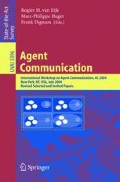Abstract
Recent work in the design of agent interaction protocols has focused on applications involving dialectical argumentation — the giving and receiving of reasons for statements. Yet the most widely-known language for agent communications — the FIPA ACL — lacks locutions for such argument. Drawing on both speech act theory and the philosophy of communicative action, we first present a novel typology of speech acts for agent communications. We use this as the basis for proposing an interaction protocol, called Fatio, comprising five locutions we consider necessary for argumentation, and which may be added to the FIPA ACL. Both an axiomatic and an operational semantics for the Fatio Protocol are given.
Access this chapter
Tax calculation will be finalised at checkout
Purchases are for personal use only
Preview
Unable to display preview. Download preview PDF.
References
Amgoud, L., Parsons, S., Maudet, N.: Arguments, dialogue, and negotiation. In: Horn, W. (ed.) Proceedings of the Fourteenth European Conference on Artificial Intelligence (ECAI 2000), Berlin, Germany, pp. 338–342. IOS Press, Amsterdam (2000)
Austin, J.L.: How To Do Things with Words. Oxford University Press, Oxford (1962)
Colombetti, M., Verdicchio, M.: An analysis of agent speech acts as institutional actions. In: Castelfranchi, C., Johnson, W.L. (eds.) Proceedings of the First International Joint Conference on Autonomous Agents and Multi-Agent Systems (AAMAS 2002), Bologna, Italy, pp. 1157–1164. ACM Press, New York (2002)
Domson, C.A.: Nicolas Fatio de Duillier and the Prophets of London: An Essay in the Historical Interaction of Natural Philosophy and Millennial Belief in the Age of Newton. Arno Press, New York (1981); Reprint of PhD Thesis awarded at Yale University (1972)
Dummett, M.: What is a Theory of Meaning (II). In: The Seas of Language, pp. 34–93. Clarendon, Oxford (1993)
Edwards, M.R. (ed.): Pushing Gravity: New Perspectives on Le Sage’s Theory of Gravitation, Apeiron, Montreal, Quebec, Canada (2002)
FIPA. Communicative Act Library Specification. Standard SC00037J, Foundation for Intelligent Physical Agents (2002)
Gordon, T.F.: The Pleadings Game: An exercise in computational dialectics. Artificial Intelligence and Law 2, 239–292 (1994)
Greenwood, K., Bench-Capon, T., McBurney, P.: Towards a computational account of persuasion in law. In: Sartor, G. (ed.) Proceedings of the Ninth International Conference on AI and Law (ICAIL 2003), pp. 22–31. ACM Press, New York (2003)
Habermas, J.: The Theory of Communicative Action: Reason and the Rationalization of Society, Heinemann, London, vol. 1 (1984); Translation by McCarthy, T.: Theorie des Kommunikativen Handelns, Band I, Handlungsrationalitat und gesellschaftliche Rationalisierung. Suhrkamp, Frankfurt, Germany (1981)
Hamblin, C.L.: Fallacies. Methuen, London (1970)
van Lunteren, F.: Nicolas Fatio de Duillier on the mechanical cause of universal gravitation. In: [6] (2002)
McBurney, P., van Eijk, R.M., Parsons, S., Amgoud, L.: A dialogue-game protocol for agent purchase negotiations. Journal of Autonomous Agents and Multi-Agent Systems 7(3), 235–273 (2003)
McBurney, P., Parsons, S.: Representing epistemic uncertainty by means of dialectical argumentation. Annals of Mathematics and AI 32, 125–169 (2001)
McBurney, P., Parsons, S.: Games that agents play: A formal framework for dialogues between autonomous agents. Journal of Logic, Language and Information 11(3), 315–334 (2002)
McBurney, P., Parsons, S.: Engineering democracy in open agent systems. In: Omicini, A., Petta, P., Pitt, J. (eds.) ESAW 2003. LNCS (LNAI), vol. 3071, p. 519. Springer, Heidelberg (2004)
McBurney, P., Parsons, S., Wooldridge, M.: Desiderata for agent argumentation protocols. In: Castelfranchi, C., Johnson, W.L. (eds.) Proceedings of the First International Joint Conference on Autonomous Agents and Multi-Agent Systems (AAMAS 2002), Bologna, Italy, pp. 402–409. ACM Press, New York (2002)
Parsons, S., Wooldridge, M., Amgoud, L.: An analysis of formal interagent dialogues. In: Castelfranchi, C., Johnson, W.L. (eds.) Proceedings of the First International Joint Conference on Autonomous Agents and Multi-Agent Systems (AAMAS 2002), pp. 394–401. ACM Press, New York (2002)
Paurobally, S., Cunningham, J., Jennings, N.R.: Ensuring consistency in the joint beliefs of interacting agents. In: Wooldridge, M., Rosenschein, J.S., Sandholm, T., Yokoo, M. (eds.) Proceedings of the Second International Joint Conference on Autonomous Agents and Multi-Agent Systems (AAMAS 2003), Melbourne, Australia, pp. 662–669. ACM Press, New York (2003)
Pitt, J., Mamdani, A.: Some remarks on the semantics of FIPA’s Agent Communications Language. Journal of Autonomous Agents and Multi-Agent Systems 2, 333–356 (1999)
Schut, M., Wooldridge, M.: The control of reasoning in resource-bounded agents. Knowledge Engineering Review 16(3), 215–240 (2001)
Searle, J.: Speech Acts: An Essay in the Philosophy of Language. Cambridge University Press, Cambridge (1969)
Sen, A.: Rationality and Freedom. Harvard University Press, Cambridge (2002)
Singh, M.P.: An ontology for commitments in multiagent systems: toward a unification of normative concepts. Artificial Intelligence and Law 7, 97–113 (1999)
Tennent, R.D.: Semantics of Programming Languages. Prentice-Hall, Hemel Hempstead (1991)
Verdicchio, M., Colombetti, M.: Dealing with time in content language expressions. In: van Eijk, R.M., Huget, M.-P., Dignum, F.P.M. (eds.) AC 2004. LNCS (LNAI), vol. 3396, pp. 91–105. Springer, Heidelberg (2005)
Walton, D.N., Krabbe, E.C.W.: Commitment in Dialogue: Basic Concepts of Interpersonal Reasoning. State University of New York Press, Albany (1995)
Wooldridge, M.J.: Semantic issues in the verification of agent communication languages. Journal of Autonomous Agents and Multi-Agent Systems 3(1), 9–31 (2000)
Wright, C.: Strict finitism. In: Realism, Meaning and Truth, pp. 107–175. Blackwell, Oxford (1993)
Author information
Authors and Affiliations
Editor information
Editors and Affiliations
Rights and permissions
Copyright information
© 2005 Springer-Verlag Berlin Heidelberg
About this paper
Cite this paper
McBurney, P., Parsons, S. (2005). Locutions for Argumentation in Agent Interaction Protocols. In: van Eijk, R.M., Huget, MP., Dignum, F. (eds) Agent Communication. AC 2004. Lecture Notes in Computer Science(), vol 3396. Springer, Berlin, Heidelberg. https://doi.org/10.1007/978-3-540-32258-0_14
Download citation
DOI: https://doi.org/10.1007/978-3-540-32258-0_14
Publisher Name: Springer, Berlin, Heidelberg
Print ISBN: 978-3-540-25015-9
Online ISBN: 978-3-540-32258-0
eBook Packages: Computer ScienceComputer Science (R0)

